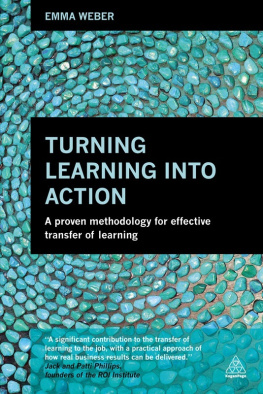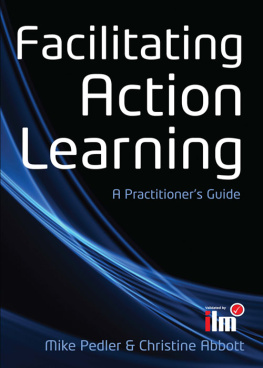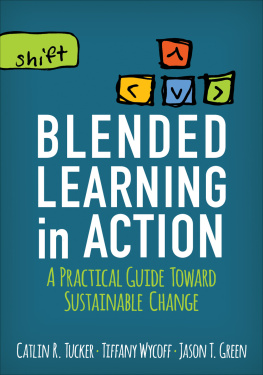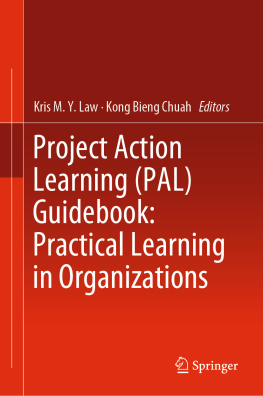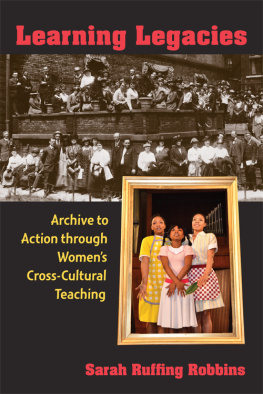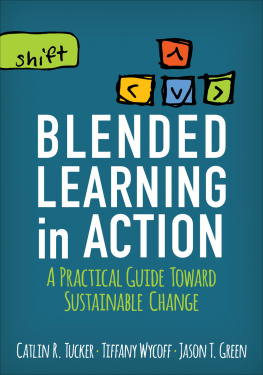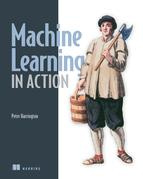Yury Boshyk - Action Learning and its Applications
Here you can read online Yury Boshyk - Action Learning and its Applications full text of the book (entire story) in english for free. Download pdf and epub, get meaning, cover and reviews about this ebook. year: 2010, publisher: Palgrave Macmillan, genre: Romance novel. Description of the work, (preface) as well as reviews are available. Best literature library LitArk.com created for fans of good reading and offers a wide selection of genres:
Romance novel
Science fiction
Adventure
Detective
Science
History
Home and family
Prose
Art
Politics
Computer
Non-fiction
Religion
Business
Children
Humor
Choose a favorite category and find really read worthwhile books. Enjoy immersion in the world of imagination, feel the emotions of the characters or learn something new for yourself, make an fascinating discovery.

- Book:Action Learning and its Applications
- Author:
- Publisher:Palgrave Macmillan
- Genre:
- Year:2010
- Rating:5 / 5
- Favourites:Add to favourites
- Your mark:
- 100
- 1
- 2
- 3
- 4
- 5
Action Learning and its Applications: summary, description and annotation
We offer to read an annotation, description, summary or preface (depends on what the author of the book "Action Learning and its Applications" wrote himself). If you haven't found the necessary information about the book — write in the comments, we will try to find it.
Action Learning and its Applications — read online for free the complete book (whole text) full work
Below is the text of the book, divided by pages. System saving the place of the last page read, allows you to conveniently read the book "Action Learning and its Applications" online for free, without having to search again every time where you left off. Put a bookmark, and you can go to the page where you finished reading at any time.
Font size:
Interval:
Bookmark:
Verna J. Willis
Brigadier General Robert Lexow Dilworth, coeditor of this volume with Yury Boshyk, passed away unexpectedly on June 6, 2009, when he suffered a fatal heart attack. Fortunately, he left to us a brilliant example to follow and a vibrant legacy to draw upon, although we are also left with much that he envisioned still to do. In this, he is like Reg Revans who, before Lex, carried the flag for action learning while he lived and gathered up a growing group of committed people to carry on his work. Both men worked tirelessly and unpretentiously in preparation for the years ahead, challenging those willing to learn with and from each other, and championing their best efforts.
General Dilworth who also held the distinguished title of Associate Professor Emeritus from Virginia Commonwealth University in Richmond, Virginia has been known to all his friends and many of his professional contacts and acquaintances as simply Lex. He viewed himself as an ordinary man doing ordinary things, with extraordinarily hard work and attentiveness. The fact that he was by no means ordinary is beside the point; if he made extraordinary contributions, he was sure that everyone else could do the same. He wanted to be called Lex, and we will do this, knowing that he would not set himself above anyone, face-to-face or in print, and risk ruining a possibly rewarding friendship. He made friends with great gusto, and with limitless appreciation of who each person had been, was, and yet might be.
Lex took five years (until 2002) to organize and write his personal history from records and recollections of the first 65 years of his life, more than 31 of which were devoted to his active service in the U.S. Army. If one adds to that the years he spent in college in the reserve officers training (R.O.T.C.), plus a prior period when he briefly belonged to the Air Force Reserve, Lex spent more than half of his life to that point in preparatory and active military service.
Lex titled his privately held memoirs the Reflective Mapping of a Soldiers Life and Times. While he was writing his 2008 book, The Fogs of War and Peace: A Midstream Analysis of World War III with his Israeli colleague, Shlomo Maital, Lex told us that he then realized perhaps as never before how much his soldiers life had influenced the evolution of his thinking and acting in the world. No small part of this was the experience of living and working in widely different cultures in his overseas postings. There was also a major shift in his worldview in the months immediately after his Army retirement in 1991, when he simultaneously took on a civilian job in Florida and began his doctoral studies at Teachers College, Columbia University, commuting between these new postings.
A few references to his life before he received his R.O.T.C. officers commission in the U.S. Army in June, 1959 may help us to see how Lex lightheartedly and youthfully became engaged in his military career. It appears that he found a real home in the Service, made life-long friendships there, and contributed far beyond what was required of him to be a good soldier. This is the pattern he set for all of his adult life: friendship and giving, personal discipline and impeccable accountability, and wondrously generous support to others so that they have been empowered to give their best as well. The words of the Army slogan, Be all that you can be, were not empty for him.
Lexs mother and father, Linda Lexow and Robert Oliver Dilworth, were born around the turn of the twentieth century, married in 1925, and Lex was their only child. Growing up in Chicago was apparently not a happy time for him, for he has titled that section of his memoirs The Dark Years, and says that, although his mother (estranged from his father) held him at the center of her life, he lived what felt like a chaotic and insecure childhood. It was not until he and his mother moved south for The Miami Years (19525) in high school that Lex began to come into his own sense of worth. Though he never forgot childhood friends from Chicago and visited them regularly, it is in Florida that he grew more confident as a social individual who, for the first time, called himself Lex to his friends, and let that stand for his core identity.
One high school mathematics teacher, Sarah McClendon, made a particularly lasting impression. Even though he did not star in her classes, she saw both his potential and his needs. She obtained tickets for him so he could attend his senior prom, was instrumental in helping him obtain a college scholarship, and wrote in his yearbook Keep a gain.
For him, he said, this translated into a personal mantra: The key to life is to stay ahead. From then on, this has obviously meant to him that if he tried, he could always gain just a little more, do just a little more, be just a little more than ever he thought he could. He learned to expect the same keep a gain from others, and has always helped them pick themselves up if they have fallen short of doing so. Thus, it is not by accident that he has inspired and nurtured so many people who have happened to enter his sphere of influence or who have sought him out.
Lex grew up in an intensely patriotic and politically energized era, when Franklin D. Roosevelt was President. People were planting victory vegetable gardens, even in urban areas, to supplement food supplies for civilians and military alike in a nation at war. Lexs father grew one. Americans were all-consumed with winning World War II, and honoring those who sacrificed their lives to fight it. Lex was well acquainted with economizing and earning his own money for everything he craved, working at typical jobs for youngsters in those days. He had a newspaper delivery route, and earned money for a new bicycle by sweeping floors in the barber shop below the tiny apartment where he lived. Later, he worked as a movie usher, a bellhop and at diverse summer jobs whatever he could pick up for pocket money. Ever the entrepreneur, he soon figured out ways to do various kinds of trade-offs for profit.
One summer, during high school, he went back to Chicago and worked with his father as an electricians apprentice. He tells us in his memoir that he learned a valuable lesson there. When a new air conditioning installation did not work in the former Palmolive Building (now the Playboy) during a ceremony called especially to celebrate its completion, specialists were flown in to fix the problem. An electricians apprentice asked if he could help, crawled under the installation, found a switch that had not been turned on, and everything worked. What Lex learned from this was to always involve everyone.
A budding strategist and determined implementer of his strategies, Lex seems at an early age, unsuspected by almost everyone, to be heading for some sort of leading role in the world. He decided in childhood that, despite his uneven academic performance, he was definitely going to college. In his own words, he never doubted it. It was a momentous decision, and decades later he could still name the place and moment when this certainty occurred to him. Even in those dark years, he found within himself a basic optimism. Throughout his future life, he remained rock-solid confident that, whenever he said he was going to do something, it was as good as done.
He knew of family background in military service, for Dilworth ancestors had served in both the American Revolution and the Civil War. In light of the war news of the early 1940s and Dilworth tradition, it is not surprising that he viewed a military career as one serious postcollege option for him, or that he strategized toward that end by signing up for and R.O.T.C. at the University of Florida at Gainesville. He was, at the time of college entry, already enrolled in the Air Force Reserve though he had, in his words, side-stepped basic training to finish high school.
Font size:
Interval:
Bookmark:
Similar books «Action Learning and its Applications»
Look at similar books to Action Learning and its Applications. We have selected literature similar in name and meaning in the hope of providing readers with more options to find new, interesting, not yet read works.
Discussion, reviews of the book Action Learning and its Applications and just readers' own opinions. Leave your comments, write what you think about the work, its meaning or the main characters. Specify what exactly you liked and what you didn't like, and why you think so.

